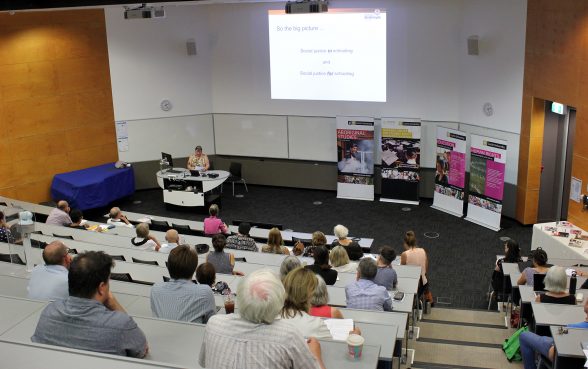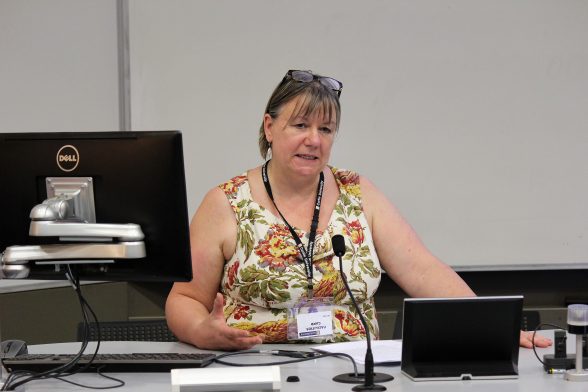2020
December 2020
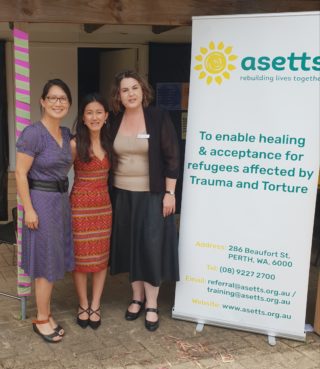
International Human Rights Day 2020
On the 10th of December, the Centre for Human Rights Education co-hosted an event with ASeTTS in recognition of International Human Rights Day, in line with this year’s theme “Recover Better: Stand Up for Human Rights”.
A film screening of ‘How I Became a Refugee‘ was held for ASeTTS staff, stakeholders and clients followed by Q&A with filmmaker Dr Marilyn Metta and Rubi Ni Chin as guest speakers.
Photo courtesy Marilyn Metta and includes Marilyn and Rubi with ASeTTS CEO and CHRE alumnus, Merissa Van Der Linden.
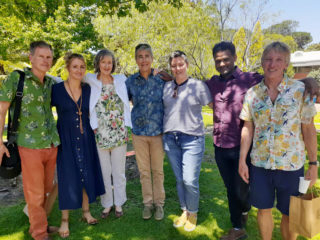
Professor Offord awarded Emeritus title
Congratulations to Professor Baden Offord who has been awarded the title “Emeritus Professor”. This title is a prestigious honour and made in recognition of his distinguished service as a Professor of Cultural Studies and Human rights and as the Director of CHRE, and his commitment and academic leadership in human rights, sexuality, cultural studies and education at Curtin University.
Wonderful news, Emeritus Professor Baden Offord! Wishing you well for the next chapter in your life.
Photo credit: Marziya Mohammedali
A Sad Farewell to Professor Baden Offord
The 8th of December was Professor Baden Offord’s last day at the Centre for Human Rights Education (CHRE) at Curtin University. Baden held the Dr Haruhisa Handa Chair of Human Rights and the position as Director of CHRE since January 2015.
It is hard to condense our love and appreciation for Baden into a short news item – he is an extraordinary and strident human being, scholar, and human rights activist.
Baden has a profound ability to build collectives wherever he goes, to bring people together and to make people feel heard and understood. He has an incredible generosity of spirit and is deeply caring in everything that he does.
One of the many extraordinary contributions Baden has made to the CHRE was to initiate the Annual Curtin University Human Rights lecture in 2016 to consider how we might understand human rights, and how we might understand ourselves, our communities, and beyond. This lecture has been presented by Professor Gillian Triggs, Dr Waleed Aly, the Honourable Michael Kirby AC CMG, Behrouz Boochani, and Dean Adrien Wing in 2020.
Under his leadership, Baden has mentored us all, and many others in the University and the Perth community. We have all learned enormously from his leadership, from his own lived experience, and his willingness to attend so deeply to so many.
Baden also has very good taste in cakes. Our afternoon teas will not be the same.
You are loved Baden. So very loved. Thank you for everything.
In 2021, Associate Professor Caroline Fleay and Dr Lisa Hartley will be sharing the CHRE Director position.
You can view a collection of memories from Baden’s time with the CHRE here. Video photograph credits: Gaylene Galardi; Christopher Macfarlane; Chris Lewis; Yirga Gelaw Woldeyes; Misty Farquhar; Mary Anne Kenny; Lisa Hartley; and Baden Offord.
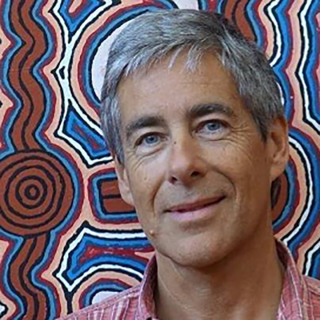
September 2020
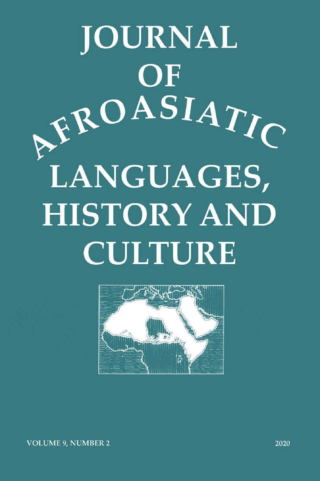
Publication by Dr Gelaw Woldeyes: Journal of Afroasiatic Languages, History and Culture
Dr Yirga Gelaw Woldeyes has been researching for an article that has just been published as a special issue in the Journal of Afroasiatic Languages, History and Culture, Vol. 9, No. 2, 2020, titled ‘Colonial Re-Writing of African History: Misinterpretations and Distortions in Belcher and Kleiner’s Life and Struggles of Walatta Petros‘. This research is based on Yirga’s sabbatical field work and travel grant that he from the Australian Academy of the Humanities in 2019.
Written in response to a book written by Wendy Belcher and Michael Kleiner based on ancient text about Ethiopian Saint Woletta Petros, Yirga hopes that the article will start a critical and sensitive conversation, as the themes concern complex and challenging issues regarding academia moving beyond its colonial past.
Yirga writes:
“A western lens with a deliberate distortion of the facts has been applied to the text, using contemporary western understandings of marriage and monastic life to interpret a 17th century Ethiopian nun.”
“The article will demonstrate that the colonial practice of taking African intellectual resources and using them to rewrite African history is not a relic of the past, but an ongoing and supported practice within universities.”
“This article seeks to prompt a change in the writing of African history, where the agency of black people to narrate their own histories and experiences is respected and supported.”
“In a time when people are demanding that black lives matter, we in the academy must demand that black voices matter too.”
Congratulations, Yirga, on getting this important work published.
August 2020
Statement in Support of Mr Julian Assange
NCSEHE 2020/21 Research Grants Program Success, Dr Lisa Hartley
Dr Lisa Hartley, along with colleagues working through the Refugee Education Special Interest Group (RESIG), has been successful in securing a grant through the National Centre for Student Equity in Higher Education (NCSEHE). The project, titled COVID-19 online learning landscapes and CALDMR students: Opportunities and challenges, was one 17 successful projects out of 103 applications, a record number of applications and successes for this program.
Project details
Lead institution: University of New South Wales
Researchers: Sally Baker, Lisa Hartley, Loshini Naidoo, Rachel Burke, Tebeje Molla, Clemence Due, Joel Anderson, Teresa De Fazio, Carolina Morison, William Mude and Ravinder Sidhu
Project abstract: This study explores the effects of remote learning environments induced by the COVID-19 pandemic and its impact on the capacity of universities to offer equitable teaching and learning services to Culturally and Linguistically Diverse Refugee and/or Migrant (CALDMR) populations. Building on existing research undertaken by team members and working as an interdisciplinary collective of educators and equity practitioners under the Refugee Education Special Interest Group (RESIG), we propose a critical/strengths-based mixed-methods approach to develop a holistic picture of the challenges and opportunities for CALDMR students and universities within a changing teaching and learning landscape.
Congratulations to Lisa and the team of researchers involved with this project!
COVID-19 and the relentless harms of Australia’s punitive immigration detention regime
On the 1st of August 2020, an article co-authored by Associate Professor Caroline Fleay and colleagues Anthea Vogl, Claire Loughnan, Philomena Murray, Sara Dehm, was published in Crime, Media, Culture: An International Journal online.
The article is ‘COVID-19 and the relentless harms of Australia’s punitive immigration detention regime.’
“Calls for the urgent release of people seeking asylum, refugees and other non-citizens held in immigration detention centres began as soon as the magnitude and reach of the global health crisis associated with COVID-19 became clear. Public health organisations quickly identified detention centres, as sites of mandatory and often overcrowded social confinement, as extremely high risk places for both infection and onward transmission of COVID-19.” Read the full article here.
June 2020
Towards Inanition: Diminishing The Humanities, Communications And Arts At Our Peril
On the 23rd of June 2020, Professor Baden Offord, Director of the Centre for Human Rights Education published an article, ‘Towards Inanition: Diminishing The Humanities, Communications And Arts At Our Peril‘, in Arena Online. The article addresses the announcement of the previous week by the Australian Minister for Education, Dan Tehan, regarding the Australian government’s proposed “new fee structure for universities that will radically alter the focus of higher education to socially engineer students away from the humanities, arts, communications and social sciences.”
Baden writes: “The humanities inculcate the very essence of doing human rights and social justice work through fostering dialogue for being, by helping us to realise that the other is always inside. These are not mere add-ons or afterthoughts to have sit or remain in the margins of a civilised society. They are central concerns, crucial to our survival as a species, as individuals, as a society. Where do we learn how to challenge authority and question the status quo? To understand the socio-cultural and political landscape with its intricacies and grapple with issues such as race, disability, sexuality, age, class and gender? To find ways of living on this planet sustainably by asking difficult and hard questions about what is needed for humanity’s co-existence and co-survival? To end poverty and economic degradation for all people through principles of equity and access? Such things are learned through philosophy, history, literature, religion, art, music, media, cultural studies and language—we ignore them at our own peril.”
Read the full article here.
Dr Yirga Gelaw Woldeyes Media Engagements
June was a busy month for Dr Yirga Gelaw Woldeyes with several media interviews taking place. He was interviewed by Adebabay Media on his research related to pressing humanitarian and human rights issues, questions of epistemic and social justice, and the relevance of education in Ethiopia. The interview was featured via YouTube and Facebook in 2 parts. Part 1: Streamed live on 10 Jun 2020. Part 2: Streamed live on 16 Jun 2020.
He was interviewed by SBS Radio in Amharic about the impact of GMO in Ethiopia. 13 June 2020. Listen here.
Yirga was also interviewed by Reeyot Alemu on the topic of Black Lives Matter movement following the murder of George Floyd by a police officer in the USA, on Ethio 360 Special Program. 2 June 2020. Watch here.
May 2020
Publications news
Dr Marilyn Metta has had an abstract for a paper titled ‘Reclaiming the Maternal Metis Body: Pregnancy, Birthing, and Mothering through Intimate Abuse and Coercive Control’ accepted for the Lilith: A Feminist History Journal’s special issue on ‘The Female Frame: Biopolitics and Wellbeing in Australian and Global Perspective’.
Dr Yirga Gelaw Woldeyes’s new journal article based research undertaken during study leave in late 2019 entitled ‘“Holding Living Bodies in Graveyards”: The Violence of Keeping Ethiopian Manuscripts in Western Institutions’ is available to read here.
April 2020
Refugees need protection from COVID-19 too, and must be released
The Centre’s Associate Professor Caroline Fleay, along with colleagues from The University of Melbourne and University of Technology Sydney, had a piece published in The Conversation on 24 April 2020, that discusses the measures needed by the Federal Government to prevent and control the spread of COVID-19 among people forced to remain in immigration detention.
“The social distancing measures adopted across Australia appear to be halting the spread of the coronavirus in the general community. But the Australian government continues to fail to provide proper protections for many groups who are most at risk. They include Aboriginal and Torres Strait Islander people in remote communities, people in prisons and youth detention centres, and those who are forced to remain in sites of immigration detention.
This leaves them, and the rest of us, at serious risk of infection.”
Read the full article here.
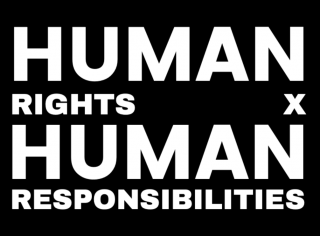
CHRE Partnership Project: Human Rights x Human Responsibilities
The Centre for Human Rights Education is excited to announce that it has partnered with the Museum of Tolerance to contribute to and support their new campaign called “Human Rights x Human Responsibilities”. Over the next 30 weeks this initiative will be starting conversations based around all 30 articles of the Universal Declaration of Human Rights. This is a creative, multi-cultural, multi-disciplinary and multi-media examination of our rights and responsibilities.
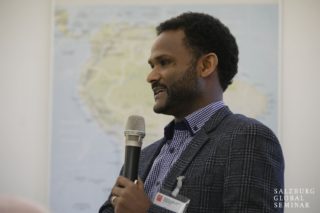
Princeton University Library Research Grant awarded to Dr Woldeyes
Dr Yirga Gelaw Woldeyes has won the Princeton University Library Research Grant in the amount of USD 4,538 for his project The social function of Ethiopian magic scrolls: A study based on Ethiopian Geez collections at Princeton University. Friends of the Princeton University Library awarded this highly competitive grant to Yirga to conduct his research at Princeton Library. Due to COVID-19, onsite services in all Princeton University Library physical locations have ceased operations until further notice, and Yirga will be informed when he is welcome to conduct his research in the future.
March 2020
Centre for Human Rights Education
Statement on the COVID-19 Pandemic
At this critical time, as we face unprecedented global change and uncertainty, we echo the calls of many others that compassion, solidarity and empathy must be reflected in our care for each other and the community – especially the most vulnerable and marginalised.
All of us at Curtin University’s Centre for Human Rights Education team have learned through our teaching, research, community outreach and advocacy of the acute awareness of the importance of solidarity and care for everyone.
We strongly believe that human rights and social justice must be at the heart of all Government and community policy and practical action.
Responding to the COVID-19 pandemic, we will continue to stand as advocates for those who are othered, stigmatised or excluded.
We recognise the importance in our everyday lives of working together and protecting each other. We can do this by drawing on the principles of social justice, intersectionality, equality and human rights.
To give one example, social distancing in the face of the COVID-19 Pandemic is social justice in practice and action.
We rally behind the calls to participate in social distancing (at the very least) so that we can help “flatten the (growth) curve” of the virus.
Paying attention to social distancing and being self-aware will help ensure the protection of us all, but particularly the vulnerable.
In practising social distancing we are, in a humanitarian sense, all first responders.
It is also an act of social justice to recognise that not everyone is able to do this: for example, people who are in detention or incarcerated, health workers and the homeless. Authorities must take responsibility and take action to support these and other vulnerable people.
We know that the COVID-19 Pandemic has already highlighted profound social inequalities and forms of discrimination and social exclusion regarding who might be expendable.
We call for an approach to the pandemic that is inclusive of everyone.
Baden Offord, Lisa Hartley, Marilyn Metta, Gaylene Galardi, Yirga Woldeyes, Greg Watson, Misty Farquhar and Caroline Fleay.
Statement by Centre for Human Rights Education
A Major Test for Human Rights in Australia
The Director of Curtin University’s Centre for Human Rights Education (CHRE), Professor Baden Offord, has written to all the members of federal parliament outlining the case against legislating the proposed Religious Discrimination Bill.
Professor Offord, in his letter, describes the proposed bill as fundamentally flawed, and would adversely compromise the human rights protections for gender and sexually diverse people and communities.
Elaborating on the letter, he added, “The proposed bill is inherently retrograde and harmful to millions of Australians, and anyone who values human rights should reject the legislation outright. This is a major test of Australia’s commitment to human rights.”
Professor Offord, who has spoken publicly on his lived experience of suicide and religion as an LGBTIQ+ identified person, also shared with every member of parliament his own personal story, “Becoming human: lived experience, suicide and the complexities of being.“
In this article Professor Offord speaks directly to the profound impact of discrimination justified by religious views.
“Every day, LGBTIQ+ people face social, cultural, political, economic, judicial and other forms of prejudice. In my research, I encounter heart-rending stories of LGBTIQ+ exclusion and persecution. Just read any news feed, watch tv, listen to people in your neighbourhood or your sporting icon. It is not acceptable that the proposed and revised Religious Discrimination Bill should actually legalise discrimination and hate.”
“There has been an immense groundswell of protest against this bill across the Australian community,” said Professor Offord, “which includes the Australian Medical Association, the Australian Human Rights Commission, Equality Australia, The Coalition of Major Professional & Participation Sport (COMPPS) – which is comprised of Cricket Australia, Tennis Australia, Rugby Australia, Netball Australia, the AFL, NRL and FFA, and many others.”
“It’s also highly significant that Ahmed Shaheed, UN Special Rapporteur on freedom of religion or belief, in his most recent report on 2nd of March, has categorically rejected claims that religious beliefs ‘can be used as a legitimate justification for violence or discrimination against LGBT+ people.'”
Former high court justice, Michael Kirby, who is Patron of the Centre for Human Rights Education, wrote last week in the Sydney Morning Herald that the bill “actively facilitates intolerance and will work to divide rather than unite Australians.”
“Under this legislation, a range of health professionals, including doctors, nurses and pharmacists, would be empowered to deny treatment to those who did not share their religious beliefs.
“This bill breaches universal human rights by unfairly privileging religion over other attributes such as race, sex, disability and age. Until now these attributes have been protected by anti-discrimination laws.
“Instead of acting as a shield to protect people’s religious beliefs, this bill would be a sword to harm those with different beliefs. It will encourage the bigots and those who hide behind religious claims to pursue an agenda of hate.”
The CHRE recognises and respects a multi-religious society. However, we are concerned that LGBTIQ+ people from minority faiths may feel the threat of additional targeting on the basis of their religion.
Given these serious concerns, the Curtin Centre for Human Rights Education strongly opposes this bill and calls on the federal government to reject it wholesale.
The CHRE calls on the government to strongly reaffirm Australia’s commitment to human rights in a secular, diverse, democratic and inclusive society.
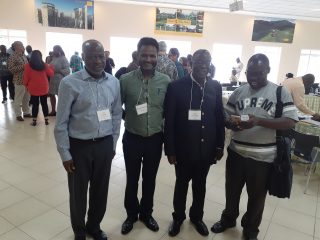
Dr Woldeyes research trip, Ethiopia and Rwanda
In Ethiopia, Dr Yirga Gelaw Woldeyes met with a group of influential Ethiopian scholars to discuss the possibility of organising a conference on Ethiopian indigenous and homegrown knowledges in December 2020. The conference would bring local leaders, traditional school scholars and women to share their experiences with the public.
Yirga also attended a 5 day research seminar (from 1 to 6 March 2020) in Kigali, Rwanda, where scholars who implemented projects on African education came together to share their experiences. The research seminar focused on developing an African indigenous methodologies for advancing knowledge through education. During the conference the delegates visited Genocide Memorial sites.
(Photo: In Kigali, Rwanda, Yirga is with with Professor Jacob Olupona from Harvard University and Professor Tite Tienou from Trinity International University)
Media
Yirga was interviewed by Meaza Birru, the highly celebrated FM radio program in Addis Ababa about how the historical origin and legacy of the ‘Land to the Tiller” movement in the 1960s Ethiopia. Watch video here.
Yirga was interviewed by FM 97.1, another Ethiopia radio program on the battle of Adwa and he was interview by Asham TV to reflect on the role of women in the battle of Adwa.
February 2020

Perth Human Library Projects
Dr Greg Watson, as the Manager of Human Library Australia, has been collaborating on several projects.
Perth Human Library partnered with Lakelands Library (Mandurah) during Seniors Week 2019 (10 – 17 November) and trained six new Human Books. This project ran two events in November 2019 which enabled members of the public to talk to their Human Books about how community seniors have experienced such things as adjusting to life as an immigrant, mental illness, family conflict, cultural and ethnic diversity.
At present, Greg is collaborating with the State Library of Queensland on its Human Library Series. This project unfolds in a series of monthly events from November 2019 to April 2020. The purpose of the series is to engage members of the public in dialogues with people (Human Books) about topics that include migrant experiences, cultural diversity and local Aboriginal heritage.
Several new projects are currently in development for Harmony Week (15 – 21 March 2020). Victoria Park Library is collaborating with Perth Human Library to train ten of its ESL Reading Circle members to become Human Books. The candidates come from a wide range of national and ethnic backgrounds and will provide members of the public with the opportunity, on 18 March (6.00pm to 7.00pm) to talk to people about multiculturalism from people who have left their homelands and moved to Australia and now call it home. The Perth Human Library will also visit two high schools during Harmony Week: Rossmoyne Senior High and Lumen Christi College.
Public Lecture: ‘Education for Social Justice’ with Professor Sue Ellis
On Thursday 13 February, the Centre for Human Rights Education partnered with the School of Education, the Centre for Aboriginal Studies (CAS) and The National Centre for Student Equity in Higher Education (NCSEHE) at Curtin University in hosting a public lecture with Professor Sue Ellis, Co-Director of the Centre for Education and Social Policy, University of Strathclyde. Professor Ellis spoke about Education for Social Justice, drawing on her work with teachers and communities in some of Scotland’s most deprived areas to explore how the coordination of policy, practice and pedagogy can make a profound difference to the educational achievement of students in communities that are traditionally not noted for academic success.
The lecture, MC’d by PVC Professor Alan Dench and welcomed to country by Mr Anthony Kickett from CAS, was well attended by academics from Curtin and universities across Perth, as well as members of the Education Department and others interested in social justice and equity.
(Photos by Gaylene Galardi)

Free to be you and me? A ‘pulse check’ of LGBTIQA+ rights in South-East Asia
On the 11th of February, an article in the Curtin Research News has highlighted Centre Director Professor Baden Offord’s current research in conducting a ‘pulse check’ of LGBTIQA+ rights in South-East Asia, in collaboration with researchers from Deakin, Monash and Flinders universities. Through this research, Baden and his team have observed striking variations in the way South-East Asian countries approach and practice the rights of LGBTIQA+ people. Read the full article here.
Professor Offord holds the Dr Haruhisa Handa Chair of Human Rights and is a Senior Research Professor in Cultural Studies and Human Rights at Curtin University. He is an internationally recognised specialist in human rights, sexuality, culture and education, and is part of a scholarly and activist community that works to decolonise and destabilise the study of sexuality in South-East Asia.
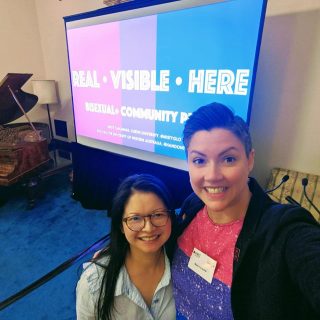
CHRE well represented at the 2020 Activisms @ the Margins Conference
Associate Professor Caroline Fleay, Dr Marilyn Metta and CHRE PhD student Misty Farquhar presented papers at the 2020 Activisms @ the Margins Conference that was held from the 10th to the 12th of February 2020 in Melbourne.
Caroline presented a paper titled ‘Collective Responses to Australia’s Punitive Asylum Seeker Policies’. Marilyn’s paper was titled ‘Storytelling and Social Activism in Young People‘. Misty co-presented a paper with Dr Duc Dau (University of Western Australia) titled ‘REAL, VISIBLE, HERE: BISEXUAL+ VISIBILITY IN WESTERN AUSTRALIA’, the presentation based on their co authored article published in Critical Social Policy on 11 January 2020.
Photo courtesy of Misty Farquhar (R).
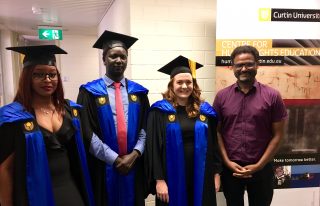
Student Graduation February 2020
Congratulations to Centre for Human Rights Education Masters students who graduated on Saturday, 8 February at Curtin University Bentley campus. Pictured at a pre-ceremony gathering are (L-R) Eunice Angaka, Juach Bul and Stacey Hearn with Dr Yirga Gelaw Woldeyes at the Centre’s offices.
Congratulations also go to Emma Hancock, Stephanie Nicholls, Jodie Colton and Joel Atunga who also attended the ceremony.
(Photo by Gaylene Galardi)
CHRE involved with Youth Justice Sector Expert Working Group
On Thursday, 6 February, Dr Marilyn Metta was invited to be part of the Youth Justice Sector Expert Working Group contributing to the draft of Social Reinvestment WA Youth Justice Report 2020.
January 2020
Contract signed with Routledge Publishers: Activating Cultural and Social Change: The Pedagogies of Human Rights
Professor Baden Offord, Associate Professor Caroline Fleay, Dr Lisa Hartley and Dr Yirga Woldeyes have signed off as Co-editors on a contract with Routledge Publishers for their major volume, Activating Cultural and Social Change: The Pedagogies of Human Rights, to be published in late 2020. The book will be included in the Routledge Research in Cultural and Media Studies series.
This book provides theoretical and practical ways of activating our knowledge and understanding of how to build a human rights culture. Addressing the question of how to approach and apply human rights within current socio-cultural, political, socio-legal, environmental, educational and global contexts, the book provides new and critical cultural studies perspectives on how to theorise, practice and contextualise human rights through the lens of diverse and varied pedagogical activity.
Welcome back to Dr Lisa Hartley
Welcome back to the Centre’s Dr Lisa Hartley, who returned in January from parental leave. Lisa has been busy writing and publishing her research with co-authors in the following publications in 2019 and early 2020:
- Hartley, L. and Pedersen, A. (2020). “They are humans and humanity comes first”: The function of attitudes towards people seeking asylum in Australia, Australian Community Psychologist, 30(1), 51-64.
- Fleay, C. Abbas, Mumtaz, G., Vakili, M., Nasrullah, Hartley, L., Offord, B., MacFarlane, C., & Sayer, R. (2019) ‘Enabling Access to Higher Education for People Seeking Asylum: A Collective Approach’, Widening Participation & Lifelong Learning, 21(2), 168-189.
- Hartley, L., Baker, S., Fleay, C., & Burke, R. (2019). ‘My study is the purpose of continuing my life’: The experience of accessing university for people seeking asylum in Australia, Australian Universities’ Review, 61(2).
- Humpage, L., Fozdar, F., Marlowe, J., & Hartley, L. (2019). Photovoice and refugee research: The case for a ‘layers’ versus ‘labels’ approach to vulnerability. Research Ethics, 15(3-4) 1–16.
- McGaughey, F., Hartley, L., Banki, S., Duffill, P., Stubbs, M., Orchard, P., Rice, S., Berg, L., & Kerdo, P. P. (2019). ‘Finally an academic approach that prepares you for the real world’: simulations for human rights skills development in higher education. Human Rights Education Review, 2(1), 70-93.
Real, visible, here: Bisexual+ visibility in Western Australia
Centre PhD student, Mx Misty Farquhar, has had a refereed, co-authored paper published on the 11th of January in Critical Social Policy. The paper titled “Real, visible, here: Bisexual+ visibility in Western Australia”, written with University of Western Australia academic Dr Duc Dau, is about the work of the Bisexual+ Community Perth over the last few years, including the lived experiences of members illustrating the group’s impact.
Abstract
The authors of the article run Bisexual+ Community Perth, a grassroots collective that works to increase bisexual+ visibility and community connection in Western Australia. This article begins by providing an evidence-base for bisexual+ activism, much of it based on the poorer mental health outcomes of bisexual+ people and the pervasive invisibility of bisexual+ people in both LGBTIQ+ communities and activism. Drawing on the work of Bisexual+ Community Perth, the article then offers a practical example of community-building as activism. It explores how collective mobilisation, bridge building, and alliances can be leveraged to make a difference in a local context, and discusses some of the challenges faced in sustaining this work. Throughout the article, the lived experiences of Bisexual+ Community Perth members are included to bring a richness to our account of the work, and to increase empathy towards bisexual+ people in general.
Read the full paper here.

